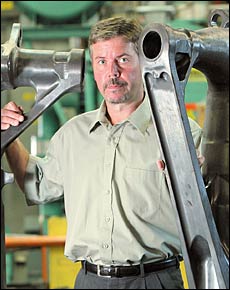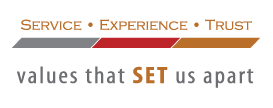|
The Oakville, Ont., company specializes in toughening metal components. It is a crucial service for the airline industry, which faces a growing demand for aircraft in coming years. Vac Aero can cash in if it meets the corresponding demand from the industry that suppliers cut costs and improve its products. At Vac Aero International Inc., the heat is always on – and in more ways than one. The Oakville, Ont.-based company has, since 1959, provided metallurgical processes for aerospace and other high-tech industries. In layman’s terms, it heat-treats aircraft engines and structural parts to provide the super strength they need to withstand wear and tear. It also coats similar items, providing a thin layer of extra-hard protection needed to greatly extend their life. A third division makes high-temperature heat-treating furnaces for other companies. If you look at what the company does literally, it blasts steel parts with temperatures that range from 1,600 to 2,200 degrees Fahrenheit and then plunges those parts into a liquid bath, usually a specialized oil. |

|
| Vac Aero International Inc. / Head office: Oakville, Ont. Business sector: Metallurgy processes for aerospace and high-tech ind. Market: Global / Number of Employees: 180 |
Vac Aero president Jeff Pritchard says his company has been able to institute cost-cutting measures while finding new markets abroad. |
Metaphorically, a similar ferocious heat is coming from the markets it serves. On the one hand, the company can look forward to explosive growth for its services. The total number of commercial aircraft circling the Earth is expected to double over the next couple of decades. Every one of those planes is going to need heat-treated landing gear and engine parts. Similarly, the market for coated components will rise at the speed of a 767 taking off from Pearson International.
The downside is equally heated, however. Aircraft manufacturers are following the lead of the auto industry. They are reducing the number of suppliers and putting enormous pressure on those that are left to reduce costs and find new ways to design and improve the parts and components they supply.
“They are saying to us, cut costs or lose the work,” says Jeff Pritchard, company president and son of its founder, Ross Pritchard. “They are forcing us to look inward to increase efficiency. We will do very well going forward if we can meet those challenges.”
Vac Aero seems to be up to the task. The company recently consolidated its European operations, moving an expensive Swiss office to much-cheaper Poland. It has also taken a 49% share in an Indian joint venture in Bangalore. The Polish operation acts as the gateway to the booming Eastern European market while Bangalore offers easy access not just to India but to the rest of Asia as well.
“India offers enormous opportunities,” Mr. Pritchard says. “It has, for example, a booming auto industry. We were approached by our Indian partner, who already had an operation there, because he wanted to add new technology and expand.
“It gives us access to the entire Asian market, and I don’t have to tell you just how explosive growth is over there.”
Poland offers the same opportunities within the former Soviet states, many of whom are undergoing their own economic revolutions.
“We are getting major contracts from Russia now. One of the nice things about that is that terms of payment are often more favourable than in North America.”
Vac Aero has grown from a four-person operation when his father founded it in 1959 to a globe-spanning, international metallurgical company with 180 staff in eight factories today.
There are three in Oakville, two in Montreal, two in Poland and the joint venture in India.
Two of those plants provide special protective coatings. It is a value-added service the company created to help dampen the boom-and-bust cycles of heat-treating. Engine parts, for example, demand wear-resistant, temperature-resistant coatings to be able to endure the friction and intense heat.
“The aerospace industry is so cyclical, so volatile, we had to get into other businesses, like coatings and making furnaces. We also got into treating components for power generation and other high-tech items as well.
“We were doing very well until the events of 9/11,” says Mr. Pritchard. “Then, sales dropped 25%. Since then, things have started to recover. The trick now is to keep our own house in shape to take advantage of the anticipated boom.”
Vac Aero owes its beginnings to equal parts necessity and vision. Ross Pritchard was working with the A.V. Roe Company on the legendary Avro Arrow project when the Diefenbaker government pulled the plug. He spotted an opportunity and started a small heat-treating operation as a Canadian unit of a larger U.S. company.
In 1972, he and his partners went to the federal Foreign Investment Review Agency and won its support to repatriate ownership.
The vision comes in when you consider the growth of the market. Southern Ontario, for example, is home to many companies that specialize in making aircraft landing gear components and systems. They take the steel, machine it into necessary structural components and then send them off to Vac Aero for heat-treating.
“Companies like Landing Gear Goodrich Corp. have to work with steel when it is soft enough to shape but then send it to us to heat-treat it and make it tough enough to resist the enormous wear and tear. People don’t realize that Southern Ontario is one of the world’s centres for landing gear manufacturers.”
The same is true for the auto industry, aircraft engine production and even high-tech medical implants.
But being a big fish in a small domestic pond is not the way to ensure a healthy future when the rest of the world is moving toward a global economy.
Earlier this year, Mr. Pritchard, who controls 45% of the company, organized a management buyout of the shares held by his two remaining partners. That stake is now held by five key employees.
Management’s current focus is getting margins back to the levels they were pre-9/11. Margins, he says, used to be good. Now, they are not so great.
“Vac Aero has a tremendous, motivated management team,” he says. “These guys are, like me, all in their 40s and most have been here maybe 15 or 20 years.
“Sure, we face challenges, but that has been part of what we do since my father started the company 47 years ago.”
Mr. Pritchard says he can stand the heat.
